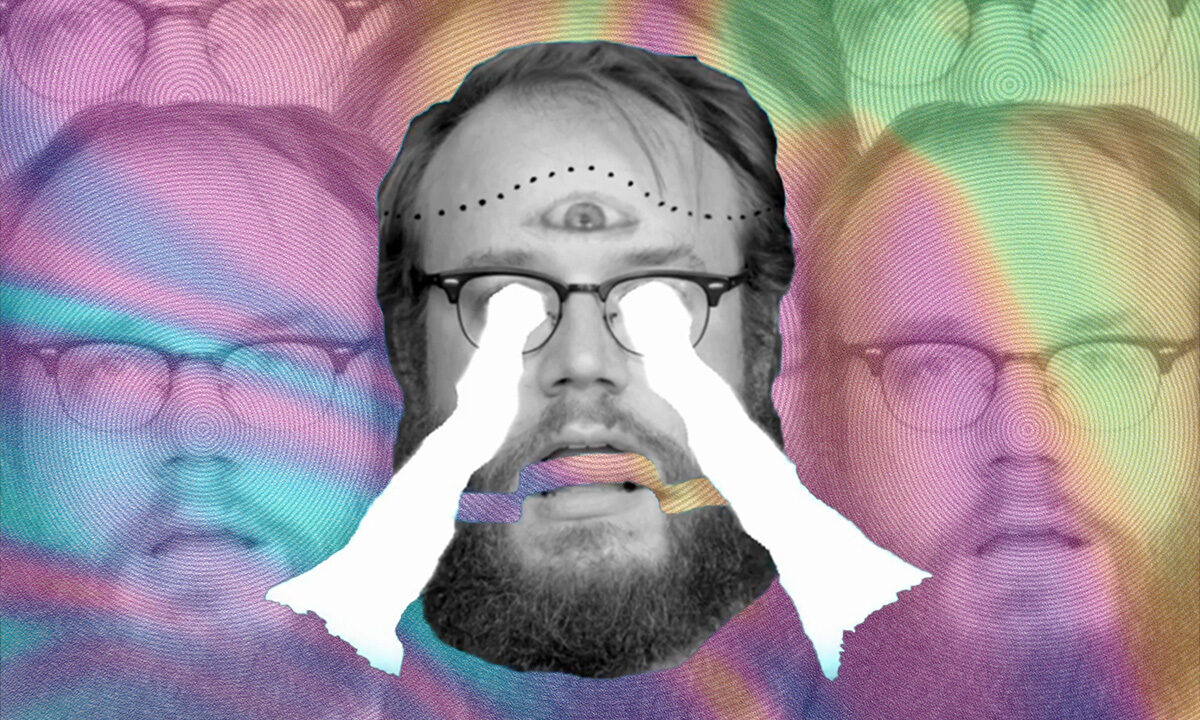The Grill Master of Acid Marxism
A well-wishing appreciation of Matt Christman. Graphic by Truthdig.
Graphic by Truthdig.
Since it appeared during lockdown in the spring of 2020, Matt Christman’s Cush Vlog has defied categorization. A first-timer might hear a show about the culture wars, or the history of the Whigs, or the statelets of the late Roman empire, or the death drive and left-right eschatologies, or the religious wars of the 16th century, or why there are no good movies about John Brown. More likely, any given show will include some combination of it all. If a newcomer knows nothing of Christman from his day job at Chapo Trap House, the podcast whose group format could not contain him, they’d likely end their first exposure feeling confused but aroused. After another episode or two, they would begin to detect fractal patterns in the host’s endless digressions, which don’t cross disciplines so much as marbleize them. You could file the show under History and Politics, but only with an asterisk, as Christman is more interested in the forces that transcend and explain history and politics. Some aggregators label the show Religion and Spirituality, which isn’t exactly wrong, but any taxonomy that puts Christman in a box with Joel Osteen isn’t quite right, either.
The show’s true subject is alienation. Specifically, the alienation of being born to die in the gray dusk of what most media millennials call late-capitalism, but which Christman describes as “whatever the hell this is.” Following the shipwreck of the Bernie Sanders movement in the early days of the pandemic, the show emerged as a kind of kaleidoscopic lighthouse for those clinging to the flotsam, assessing the unseaworthiness of available life rafts with brilliance, humor, and a complete lack of pretense. Ever since, the show has been a weekly source of solace and pleasure for tens of thousands. The news in late September that Christman had suffered a medical emergency left his fans feeling more alienated than usual, with a heightened awareness and appreciation of his gifts.
“We may be teetering on the edge of an abyss that we can’t imagine, but damn it, we have cookies.”
When Christman started streaming Cush Vlog from his Brooklyn backyard, it was obvious there wasn’t much charting involved. In an Adidas tracksuit and misshapen Packers cap, he shadow boxed around what he saw as the states of historical and psychospiritual play, pausing to read viewer comments, puff on a joint and sip on an ever-present seltzer. It was soon clear what was happening: the show was therapy, for host and audience alike. Both were trapped in the same quantum state of willed hope and honest despair. From these early shows emerged the concept of the grill pill. To take the grill pill was to reject both delusion and nihilism, log off, and find footholds of meaning in friendship, comradeship and the simple pleasures of being alive. Staring at screens and owning people online made alienation worse, but having a barbeque — that was a start. “We may be teetering on the edge of an abyss that we can’t imagine, but damn it, we have cookies,” seemed like as good a manifesto as any during the miserable summer of 2020. The Grill Stream was born.
By the time Christman moved to Los Angeles in late 2021, the show had outgrown its founding metaphor. Though still operative, the repurposed “Matrix” meme of the grill pill turned out to be the seed for something bigger. The tendrilled monologues were not collections of distinct rants, bits and observations. Connected by mycelium-like threads, they formed a whole organism — a singular style of inquiry that fused existentialism, humanistic socialism, and cultural theory, wrapped and ribboned with the mystical sensibilities of psychedelia. Like a shaggy stray that shows up at the door, it required a name. This the community provided in the coinage of Acid Marxism, a nod to the British critic Mark Fisher, who died in 2017 before he could finish his book in progress, “Acid Communism.” As with Fisher’s amorphous idea, nobody can say what, exactly, Acid Marxism means. But since it has only one master practitioner, its official symbol is the Grill Stream logo of Christman’s face sliding apart at the jaw, eyes disgorging white fire, a bulging forehead chakra crowned by the dotted incision line of the cosmic lobotomist.
Christman embodies Acid Marxism, but it’s a stretch to say he performs it. He works in a number of rhetorical traditions, including the prophetic, but his total lack of artifice makes it hard to group him with great monologists of the broadcast era. Joe Frank, Bob Lassiter and Jean Shepard sought to create theaters of the mind; Christman can barely be bothered to move away from the mic while burping. A tighter comparison is the feral pirate radio voice in the night, or the learned misfit with a 3 a.m. slot on community access TV. It’s not an insult to observe shared DNA with the young Alex Jones, who used an earlier iteration of DIY media to channel the hellfire-on-horseback preachers of the Second Great Awakening. Among lefty monologists of the podcast age, the closest in terms of talent is probably Christman’s late friend Michael Brooks. But here, too, there’s a gap. Whenever Brooks had Christman on his show, he mostly sat back and listened in bemused, poorly concealed awe.
One of Christman’s most appealing traits is a lack of awe in himself. A default-mode Midwestern modesty was deepened by some hard health knocks as a teenager and what he describes as moderate psychedelics use. “On psychedelics, you learn you don’t know anything,” Christman has said. “Understanding the profound ignorance that we all live in — that’s the real freedom.” Another of the show’s psychedelic signatures is its foregrounding of the one thing we do know: that whatever else we do on earth, we end up as worm food. Christman says he never read Ernest Becker before doing the show, but arrived at similar conclusions as Becker’s celebrated book “The Denial of Death,” about the centrality of repressed terror over nonexistence in human affairs. “The great absence shapes every event [and] cannot be talked about, only talked around, by discussing the discreet incidents that make up daily life,” said Christman in a representative riff. “We’re left to distract each other from a black hole that can’t be reckoned with. It’s nobody’s fault.”
Nobody can say what, exactly, Acid Marxism means. But it has only one master practitioner.
Christman sometimes camps on the show’s spiritual frontier to muse on the ineffable, including the possibility that our “vibrating frequencies” persist beyond death. Usually prefaced by a half-hearted sorry-not sorry for sounding like an acid head, Christman is not afraid to invoke the “background radiation of eternal oneness that we are all just a few degrees of perceiving at any given moment.” The perception of this unity — a synonym for the all-embracing primacy of love, symbolized by the Welcoming Grill — is not anti-political, but a source of meaning and energy relevant to the task of imagining and building, when conditions are right, a world beyond whatever the hell this is.
Exactly what an ecologically sane left horizon looks like, and how to build the power to carry us over it — the Marxism part of Acid Marxism — Christman doesn’t claim to know. Who does? The show’s dark prognosis for near-term radical change, or any kind of meaningful politics, is one of its most controversial features. “It will require convulsions,” Christman said on a recent show. But even though these convulsions are under way, the potential for mass political action, let alone a triumph of the left, is complicated by two of Christman’s recurring themes: the ways that the right is better suited — temperamentally, philosophically, organizationally — to steer and benefit from chaos and destruction, and the fact that most people remain hardcore addicts of the comforts and entertainments that even a crumbling version of the current system can provide. Christman is never self-righteous on this latter point, but routinely admits to playing rubber duckie in a bubble bath of his own contradictions: a self-described “apocalyptic socialist” who is also “one of the most selfish pieces of crap to ever live,” a critic of social media who is endemic to it. It’s a harsh mirror, but an unbroken one. We’re all soaking in the same morass, unable and unworthy of throwing the first stone.
In a March episode titled, “Airborne Toxic Event Planner,” Christman reiterated his faith that a future left can and will move history. “I’m not a doomer, because eventually people have to act, out of necessity. Necessity cuts through the miasma, but is also very terrifying. It means abandoning all of the comforting layers of responsibility and authority that we depend on. I struggle. I get despondent and don’t know what to do. But I have enough conviction that tethers me. I am going to choose love. It sounds like some Tony Robbins shit, but we’re all punting here. We’re psyching each other up for when the time comes, we can put our shoulder to the door jamb.”
In another episode, “Weimar? I Barely Know Her!,” Christman mused on the role contingency plays in the timing and outcome of this door jamb moment:
We can’t know what’s going to happen. We rescue ourselves partially from despair by approaching politics through that lens, while also cultivating love for those around us and for the universe…offloading our ego and emotional connection to other things and other people and animals and everything, and embracing the eternal flipping coins that make up the world we’re moving through… It’s about creating a path, a tunnel, a target, a hologram of the world to live in and orient yourself in — and creating a power source to drive you forward… I hope some of that made sense.
It did, and it usually does, even when it doesn’t. Feel better soon.
Matt Christman’s Cush Vlogs are archived here. Grill Stream audio can be found on most major podcast platforms. Transcripts of the first 184 shows have been collected in The Book of Bomb.
Your support matters…Independent journalism is under threat and overshadowed by heavily funded mainstream media.
You can help level the playing field. Become a member.
Your tax-deductible contribution keeps us digging beneath the headlines to give you thought-provoking, investigative reporting and analysis that unearths what's really happening- without compromise.
Give today to support our courageous, independent journalists.






You need to be a supporter to comment.
There are currently no responses to this article.
Be the first to respond.